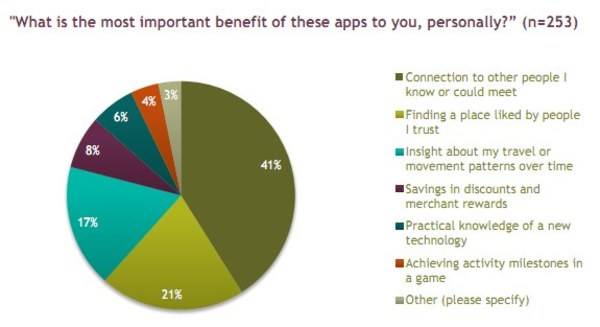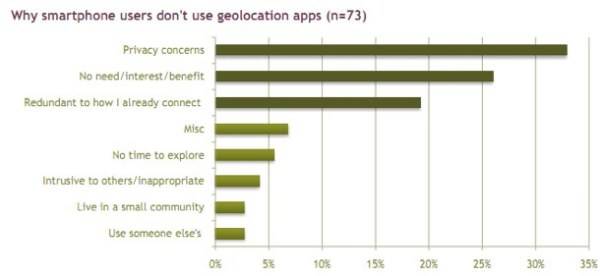Connecting with people, finding places liked by friends and tracking personal travel habits over time were listed as the primary reasons people who use location based social networks like Facebook Places, Foursquare and Google Latitude do so in a survey published by Portland, Oregon digital marketing firm White Horse. The firm surveyed 437 smartphone owners and found that discounts and gaming were not seen as significant motivators for the use of location services. (Lost in Geolocation: Why Consumers Haven’t Bought it and How Marketers Can Fix It)

56% of smartphone owners surveyed said they knew about these services and 39% of respondents said they used them. Facebook Places was the clear leader among users (42%) with Latitude (27%) and Foursquare (25%) tied somewhere behind. The biggest barriers to use among non-users? Privacy concerns and lack of clear benefit. Graphs below.


The White Horse survey includes 11 other charts and graphs and a number of recommendations. All of this has to be taken with a grain of salt, of course, because it’s a firm that does web design and marketing as a service. That 39% of respondents surveyed said they knew about and used location based services seems to me a high number, reason to be optimistic, not as the survey’s title says any indication that the sector is broken. None the less (see my disclosure below), the data is quite interesting and the recommendations are thought provoking and well articulated.
Included in those recommendations are the following:
- Companies interested in reaching potential consumers using location based services should build their own, rather than emphasize participation in existing services, because existing services add too little to the core social networking features they duplicate from Facebook, Twitter or the good old fashioned telephone.
- Companies should seek to fullfil new social functions with location apps, not just communication. That’s already covered. “Marketers will need to posit experiences & goals that make sense for their particular brands to endorse, build appropriate interactions, and test rewards and incentives,” the report says.
- Build a social media presence first. “…success will depend on engaging those customers who are most active in social media, based on an understanding of their ‘native’ social experiences in existing communities, whether physical or digital. To think that users will adopt a branded geolocation app that is unmoored from existing social experiences is not realistic.”
- Privacy: “Currently, geolocation apps handle data in ways that consumers can neither understand nor control.”
- Model after Foursquare but keep an eye on Facebook. I’m not entirely clear on what this recommendation means.
Readers interested in the location based social networking use cases and avoidance should check out our coverage including Why We Check In: The Reasons People Use Location-Based Social Networks, 2011: The Year the Check-in Died, Check-ins Are Dead? Location App Life360 Adds 1 Million Users in 10 Weeks.
Disclosure: I happen to be on an Advisory Board for White Horse design, but I missed the email when this report was sent out and just saw it written up tonight on the independent blog Marketing Pilgrim. I would have written about this report whether I had any connection to the company or not (I love this stuff) and probably would have written basically the same post here either way. If completely disinterested, I might not be able to tell you that the cookies they served at the last Advisory Board meeting were stale. Just kidding.










